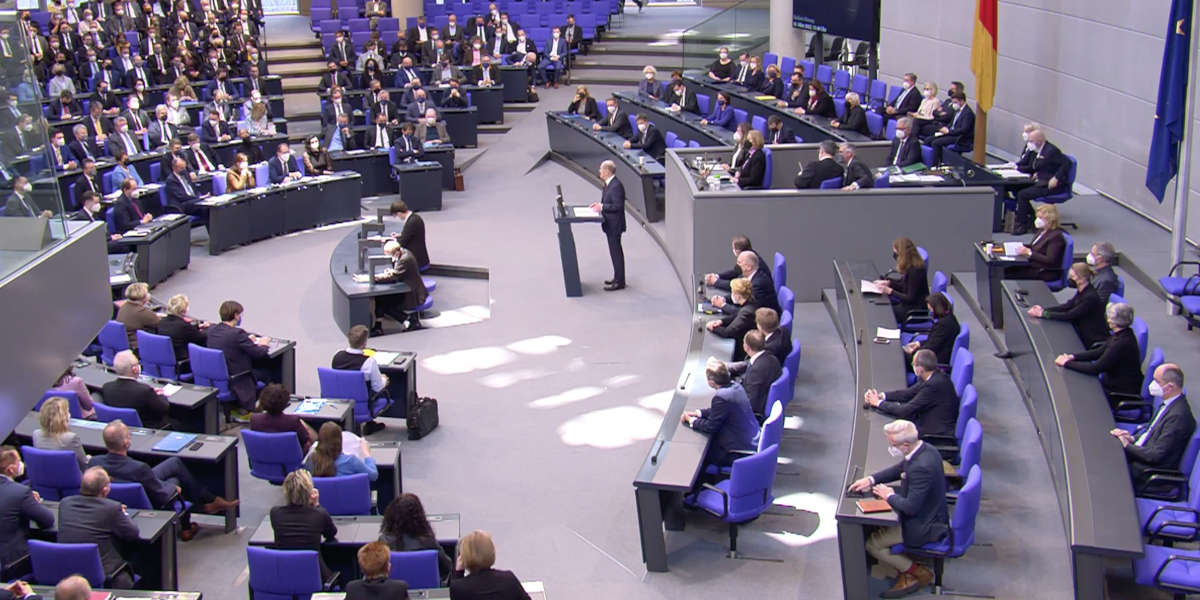In the picture
Olaf Scholz speaks at the extraordinary session of the German Bundestag on Sunday 27 February [Bundestag].
Thursday 24 February was a tremendous shock for Europeans. Someone has compared it to the emotional and resolute impact of 9/11 in the United States: on that day, Americans felt they were at war. On 24 February, Europeans experienced the same thing.
The news that Russia had begun shelling sites across Ukraine, including near Poland, and that Russian armoured troops were launching an invasion, also from Belarus, had the effect of those oxygen-sucking vacuum bombs Putin displays in this war: suddenly the decades of peace and progressive prosperity in most of Europe vanished and the abyss of the Second World War became visible to the eyes of report .
To have been abruptly confronted, on the very doorstep of the EU and NATO, with a new war that repeats some of the dynamics of that war - the savage aggression of one neighbour against another, claiming its 'Lebensraum' - explains why, in the first days of the invasion, on that weekend that changed the world, the EU countries reacted with unexpected forcefulness and unanimity, to the surprise of even themselves.
Nothing could speak more eloquently of this radical shift than the transformation seen in Germany, which was also driven by an SPD that was very much a 'Russlandversteher' (Russia-friendly), and the Greens, who are tougher on Putin but less inclined towards the expense military. The decision to send substantial war materiel to Ukraine, to significantly increase the defence budget for this year and to raise it permanently above 2 per cent of GDP in the following years, has certainly broken all the taboos of successive generations of Germans.
Germany is joining the sanctions against Moscow in the knowledge that it will have a high economic cost for the country itself; to deal with it, in the energy sector it has hinted at the possibility of reversing its ongoing nuclear shutdown, again something unimaginable when the Greens were in government. Immediately after the invasion, Angela Merkel spoke of a 'Zeitenwende', a change of era, an expression also used by her successor in the Chancellery; others have spoken of the end of the post-Cold War era. We are facing a new historical stage.
With these commitments, Germany regains the 'normality' as a power that it has lacked since the middle of the last century. With the successive stages of European integration, Germany has been gaining weight in continental decision-making. The introduction of the euro at entrance in 2002 catalysed the time of Berlin's economic leadership in an EU in which, politically, it had to work in tandem with France for the time being. Ten years later, however, with the crisis of 2010-2012 and in an enlarged Union, German political preponderance also began to become evident. Another decade has passed and now, in 2022, in the wake of the confrontation with Russia, Germany is emerging as a 'hard power', ready to bring its military capabilities to the table.
These stages of Germany's rise have taken place against the backdrop of growing European unity. The intertwining was always the will of those who governed the country, out of true Europeanist commitment and also as a way of facilitating the acceptance of Berlin's emerging power by its neighbours (the United Kingdom did not want to take it on board; Brexit should be understood as a reaction to this German predominance on the continent).
The Withdrawal to national currencies to leap to monetary union was followed a decade later by a financial crisis that forced the overcoming of certain state sovereignties in subject of banking and even fiscal policy. Each challenge, with its instabilities, has strengthened Brussels. Today, Russian aggression on the eastern flank is removing many of the reluctance to finally have a joint defence Structures beyond NATO membership: not that the creation of a European army is properly on the table, but the fall of missiles close to the very borders of the EU and the nuclear risk invoked by Putin are accelerating steps that were previously thought to be long or postponable.
All these steps have been beneficial for the Union as a whole; they have strengthened Germany's leading role, yes, but there has been a joint advance. Germany's new profile - crowned in this latest stage as a decomplexified military force - should also contribute to European cohesion. Threats to the EU have not come from German 'aggrandisement', but from other dynamics, such as Brussels' tension with the Polish and Hungarian periphery in recent years; now the challenge, from another subject, comes from big Russia. Josep Borrell has said that the invasion of Ukraine has forced the EU to wake up to geopolitical reality. The novelty compared to a century ago is that Germany is willing, or at least committed, to move agreement with the EU's geopolitical imperatives, rather than its own. The Russian attack may well have created division among EU partners, which was probably what Putin was relying on; the surprise has been the cohesion demonstrated so far.

